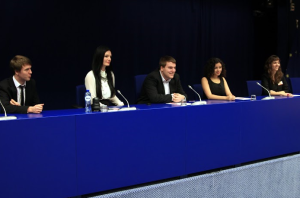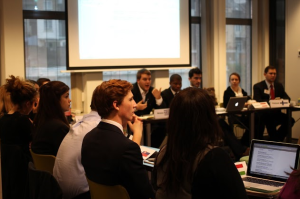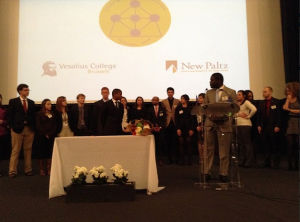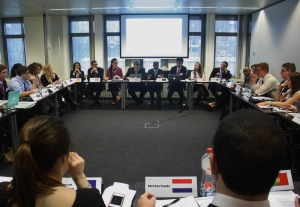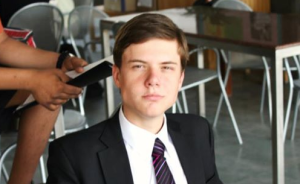
By Sean Dunn and Lital El Koubi
In an objection speech to a recommendation amendment to “liberalize” competition law, the Minister of Malta stated that the addition of an opt-out clause could be a simple concession made for those states apprehensive of the proposal.
Responding to the minister’s statement, European Commission President José Manuel Barroso, said “to add an opt-out clause would be stupid because if it is passes, it will go to the Heads of Government where it will be stricken. The head of government of Malta has been spoken to and he is in support of the recommendation.”
In a short interview during lunch, the Minister of Malta spoke of the proposal that dominated the morning’s debate, stating that he supported more unified competition law to close loopholes, preventing larger states from outcompeting smaller ones and allowing smaller states to more easily conduct digital commerce at the European level. He was dubious, however, of the recommendation as penned stating that the term “standardization” was “almost purposefully ambiguous.”
Upon recommencement, a quickly approved French amendment proposal changed “standardization” to “liberalization”. With this change, all ministers voted to approve, with the exception of Malta, leading to the display of bullying tactics.
Responding to President Barroso’s statements, the Minister of Malta expressed his personal indignation and stated that he had not been informed by his head of government of the alleged change in support, prompting the committee to take a short recess to provide the Maltese minister a special opportunity to speak with his head of government.
Upon his return, the Minister of Malta maintained that his head of government was opposed but that he would abstain prompting the committee to approve the recommendation.
Two distinctly divided camps had developed in the morning, primarily between smaller states and larger states. Among the small states, Croatia, Cyprus and Slovenia argued that as their digital sectors are not highly developed, the “standardization” of competition laws would reduce barriers for entry into those sectors and corporations from larger states could gain a dominant position in them before local digital economies can develop.
“Small member states would be at a true disadvantage if standardization of competition laws would come into effect,” Croatia’s finance minister said. “You cannot standardize competition laws inside those smaller member states whose market is completely different than that of larger member states.”
Among larger member states, there were those smaller member states, such as Romania and Bulgaria, which argued that by creating a less complicated regulatory environment, the benefit to the entire union, including small states, would be great, drawing investment and free enterprise in the digital economy.
Over the course of the morning, debate became increasingly adversarial. In response to the Cypriot minister’s declaration that she remained to be convinced of the benefit to her constituents, the Minister of Denmark asserted that Cyprus was not an important economy in the EU, going further to say “if you don’t have much, you can’t lose much.”
This transpired after two failed attempts by Croatia to strike the recommendation from the record and suggestion by Germany for the many opposing states to abstain in order to allow the legislation to pass. Despite the gridlock that characterized most of the day, the recommendation was eventually passed, with the abstention of Malta.
When asked for comment on the events of the day’s session, the minister of Malta expressed disappointment.
It has been an interesting two-day summit at the European Parliament for the Economics and Finance ministers. With four proposal recommendations passed, ministers displayed grounded will and dedication in the mission of stabilizing the economy.
The summit’s final recommendations were passed to the Heads of Government, and although it was rumored that UK Prime Minister David Cameron would not approve one of the recommendations, this was not the case and all of the recommendations were approved.
Speaking about the summit’s accomplishments, the secretariat said “we had several fears in regards to visible and rumored opposition to certain points. Yet we were able to pass through that and come together in the spirit of the EU to find solutions that benefitted the union as a whole, rather than focusing on national self interests.”


